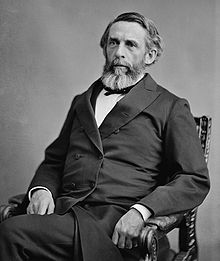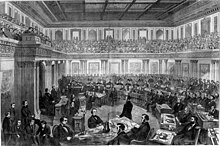George S. Boutwell
George Sewall Boutwell (born January 28, 1818 in Brookline , Massachusetts , † February 27, 1905 in Groton , Massachusetts) was an American politician . He was Massachusetts Governor from 1851 to 1853 , Congressman from 1863 to 1869, Secretary of the Treasury from 1869 to 1873, and US Senator from 1873 to 1877 . He was also one of the founders of the Anti-Imperialist League ( American Anti-Imperialist League ) and its president from 1898 to 1905.
Studies and professional career
The son of a farmer started working as a clerk in a shop in Groton in 1835. He later became the shop owner's partner and also worked as a teacher and postmaster for a few years. He then completed a law degree in 1836 .
Between 1849 and 1851 he held the office of State Commissioner for Banks in Massachusetts. From 1855 to 1861 he was Secretary of the Board of Education of Massachusetts .
Political career
Massachusetts Governor
He began his political career as a supporter of Martin Van Buren in 1842 when he was elected to the Massachusetts House of Representatives . There he represented the interests of the Democratic Party first until 1842 and then again from 1847 to 1850 . During this time he applied several times in the years 1844, 1846 and 1848 unsuccessful in elections to the House of Representatives and in 1849 and 1850 for governor of Massachusetts.
In 1850, with the support of the Free Soil Party, he was finally elected governor of Massachusetts. At the end of his two-year term from January 11, 1851 to January 14, 1853, he decided against running again. In the following two years he changed his party affiliation at the same time because of his view on slavery . In 1854 he was one of the founders of the Republican Party . In 1857 he was elected to the American Academy of Arts and Sciences .
Congressman
On July 17, 1862, he was appointed first head of the Internal Revenue Commissioner . However, he only held this office until March 4, 1863.
He was then elected a member of the US House of Representatives. There he represented the interests of the seventh and then the ninth congressional electoral district of Massachusetts until March 12, 1869 . During his term in parliament, he was also a member of the Overseer of Harvard College . In particular, he was but one of the prosecutors of the House during the unsuccessful impeachment proceedings in the Senate against President Andrew Johnson appointed in February and March. 1868
Treasury Secretary under President Grant
On March 12, 1869, the newly elected President Ulysses S. Grant appointed him Treasury Secretary in his cabinet .
During his tenure, he began in particular with the reorganization of the ministry and a reduction in national debt . He also introduced auditing of accounts in customs offices and incorporated the United States Mint into the Treasury. On March 23, 1869 there was a so-called Black Friday caused by gold speculators , which he countered with a distribution of state gold on the financial market.
On March 16, 1873 he resigned from his office. He was succeeded as Treasury Secretary by his current deputy ( Assistant Secretary of the Treasury ) William Adams Richardson .
U.S. Senator and Future Offices
On March 17, 1873, he was elected as the successor to Henry Wilson to the US Senator . As such, he held the second Senate seat in Congress until March 3, 1877.
After leaving the Senate, in 1878 President Rutherford B. Hayes gave him the task of preparing the second edition of the US Revised Statute , a collection of the then applicable US laws. Two years later, President Hayes appointed him his advisor on a commission that settled claims for damages between France and the United States.
In September 1884, he turned down President Chester A. Arthur's offer to resume the post of Treasury Secretary after the death of Charles J. Folger .
Instead, he opened a law firm in Washington, DC and took up a practice as a lawyer , where he increasingly dealt with international law . As such, he was consul in Haiti in 1885 and legal advisor to the governments of the then still independent Hawaii in 1886 and of Chile from 1892 to 1893 .
On June 15, 1898 was one of the founders of the Anti-Imperialist League , which also elected him its first president. He held this office until his death. As President of the Anti-Imperialist League, he spoke out shortly afterwards, in particular against the occupation of the Philippines after the Spanish-American War in June 1898.
In 1900, after 46 years, he changed his party preference and now supported the Democratic presidential candidate, William Jennings Bryan , who was defeated by the Republican incumbent William McKinley in the presidential election on November 6, 1900 .
Publications and speeches
Boutwell also published several books on the United States ' school system , tax law, and political economy . His work "The Constitution of the United States at the End of the First Century" ( Littleton , 1895) has long been considered the standard work on the constitution of the United States . He also made several important speeches as President of the Anti-Imperialist League. His other works include:
- Educational Topics and Institutions. Boston 1859
- Manual of the United States Direct and Revenue Tax. 1863
- Decisions on the Tax Law. New York 1863
- Tax-Payer's Manual. Boston 1865
- Speeches and Papers. 1867
- Why I am a Republican. Hartford, Connecticut, 1884
- The Lawyer, the Statesman and the Soldier. New York 1887
- The Venezualan Question And The Monroe Doctrine . In: Boston Herald , February 2, 1896
- Hawaiian annexation. Speech in Boston on December 22, 1897
- Isolation and Imperialism. Speech in Cambridge on November 4, 1898
- Imperialism and Anti-Imperialism Speech in Boston on May 16, 1899
- The War Of Despotism In The Philippine Islands. Speech in Springfield on September 5, 1899
literature
- Boutwell, George Sewall . In: James Grant Wilson, John Fiske (Eds.): Appletons' Cyclopædia of American Biography . tape 1 : Aaron - Crandall . D. Appleton and Company, New York 1887, p. 331 (English, full text [ Wikisource ]).
- Boutwell . In: Meyers Konversations-Lexikon . 4th edition. Volume 3, Verlag des Bibliographisches Institut, Leipzig / Vienna 1885–1892, p. 286.
- Biography . In: New Student's Reference Work , 1914 (English)
Web links
- George S. Boutwell in the Biographical Directory of the United States Congress (English)
- George Boutwell in the National Governors Association (English)
- Biography and portrait on the homepage of the US Treasury Department
- George S. Boutwell at the University of Virginia Miller Center of Public Affairs (English)
- George S. Boutwell in the database of Find a Grave (English)
| personal data | |
|---|---|
| SURNAME | Boutwell, George S. |
| ALTERNATIVE NAMES | Boutwell, George Sewall (full name) |
| BRIEF DESCRIPTION | American politician |
| DATE OF BIRTH | January 28, 1818 |
| PLACE OF BIRTH | Brookline , Massachusetts |
| DATE OF DEATH | February 27, 1905 |
| Place of death | Groton , Massachusetts |









